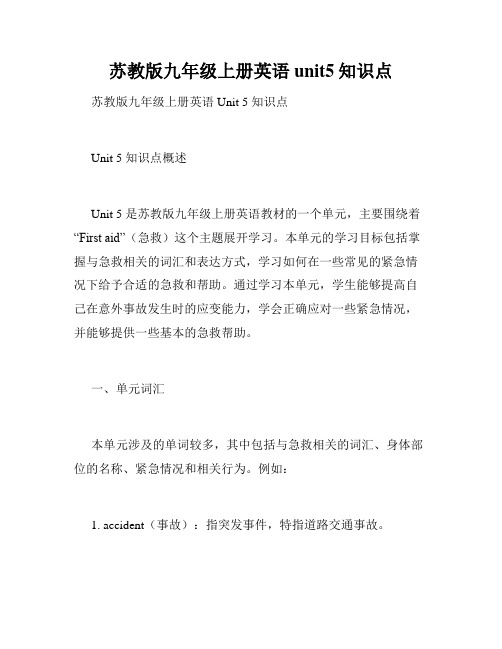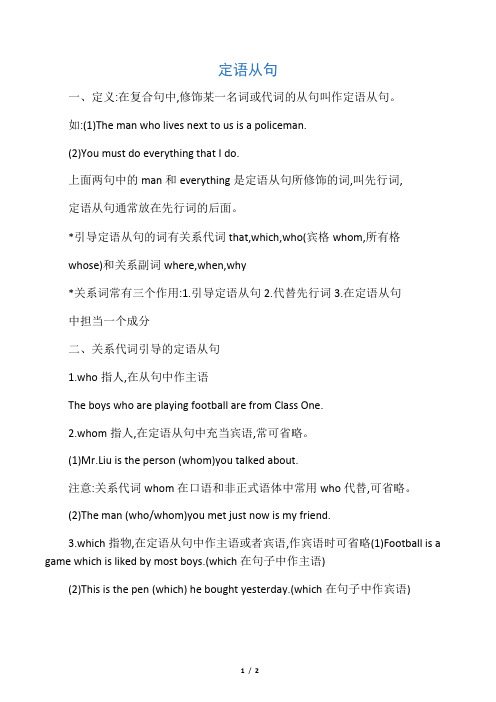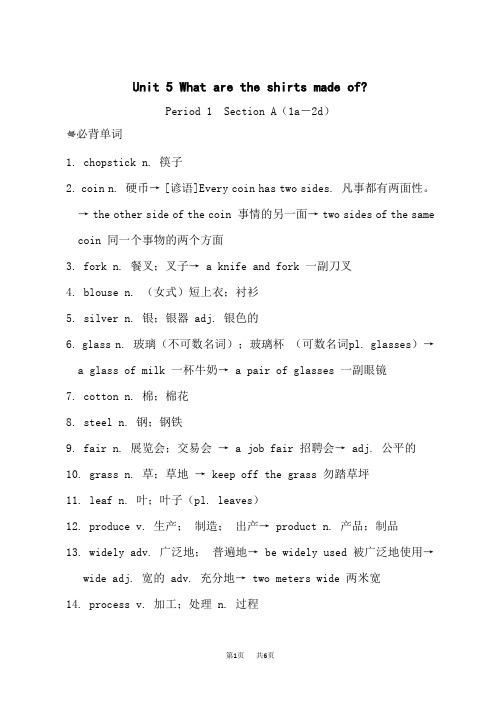九年级英语unit5语法知识点
人教版九年级英语上册第五单元考点汇总

人教版九年级英语上册第五单元考点汇总Unit 5 What are the shirts made of?一、常考词汇词型转换1.chopstick(n.)→chopsticks(pl.)筷子2.glass(n.)玻璃→glasses(pl.)眼镜3.leaf(n.)→leaves(pl.)叶子4.nation(n.)国家→national(adj.)国家/民族的→international(adj.)国际的5.France(n.)法国→(adj.)French法国(人)的,法语的→French(n.)法语→Frenchman(n.)法国人→Frenchmen(n.)6.Germany(n.)德国→German(adj.)德语的;德国(人)的→German(n.)德语;德国人→Germans(pl.)德国人7.postman(n.)→postmen(pl.)邮递员8.produce(v.)生产→product(n.)产品;制品→products(pl.)10.wide(adj.)宽的→widely(adv.)广泛地;普遍地11.protect(v.)保护→(n.)protection保护pete(v.)竞赛→competitor(n.)参赛者→competition(n.)比赛13.history(n.)历史→historical(adj.)(有关)历史的14.celebrate(v.)庆祝→(n.)celebration庆典;庆祝活动【可】15.color(n.)颜色→(adj.)colorful色彩鲜艳的16.environment(n.)环境→environmental(adj.)自然环境的二、重点短语1.be made of由...制成的(表示制成成品后,仍可看出原材料是什么)2.be made from由...制成的(在成品中已无法辨认原材料)3.be known for以...闻名4.be used for被用于...5.no matter不论;无论6.be covered with用...覆盖7.as far as I know据我所知8.by hand用手9.be good for对……有益10.on the last friday of each month最后一个星期五11.be good at擅长12.make high-technology products制造高科技产品13.the earth‘s surface地球表面14.many different kinds of许多不同种类的15.fly a kite放风筝16.such as例如17.according to根据按照18.ask for help请求帮助19.a symbol of……的象征20.put……on……把……放在……上21.be used for被用于做……22.good luck好运23.at a very high heat在高温下24.be made in在……制造的25.be famous for以……著名26.on the sides of mountains在山腰上27.traffic accident交通事故28.a kite festival风筝节29.be from来自30.turn……into……把……变成……31.send out放出32.in trouble处于困境中33.rise into上升上涨34.paper cutting剪纸35.be used by被……使用36.during the spring festival在春节期间37.sky lanterns孔明灯38.all over the world全世界三、重要知识点01be famous for=be known/well-known for因…而闻名be famous as=be known/well-known as作为…而出名be famous to=be known/well-known to为…所熟知02seem(to be)+adj.似乎是…seem to do sth.似乎要去做某事It seems/seemed that从句似乎,好像…03light①n.灯【可】;光,光线【不可数】②adj.明亮的,轻的③v.点燃,点亮(lit,lit/lighted,lighted)04be used for(doing)sth.=sth be used to do被用来做…05both…and……和…都…(连接两个并列主语时谓动为复)not only…but also…不但…而且…连接两个并列成分either…or…或者…或者…作主语时,谓动遵循neither…nor…既不…也不…就近一致原则06whatever=no matter what无论什么(用来引导让步状语从句)no matter who=whoever无论谁no matter when=whenever无论什么时候no matter where=wherever无论在哪儿07find it+adj.+to do sth.发现做某事怎么样find it+adj.+that从句发现…怎么样(it是形式宾语) find sb.doing sth.发现某人正在做某事08everyday(adj.)每天的,日常的(用在名词前做定语) every day=each day每天(位于句首/句末作时间状语) daily①adj.=everyday每天的②adv.=every day每天地eg.She watches everyday English on TV every day.09allow doing sth允许做某事allow sb.to do sth允许某人做某事be(not)allowed to do sth.(不)被允许做某事eg.It’s not allowed to smoke here.这儿不允许吸烟10continue to do sth.继续做另一件事情continue doing sth.继续做原来的事情11in trouble处于困境中in danger处于危险中in silence默默地in excitement兴奋地12send out放出,发送send up发射send for派人去请send sb.sth=send sth to sb.送给某人某物send sb.to sp.送某人去某地13have/has been around for+时间段已经存在多上时间14put…on…把…贴/放在…上put away把...收起来,放好put on穿上,上演put off推迟,延期put out熄灭put down放下put up张贴,举起,搭建15lively(指物)生动的,鲜艳的,生机勃勃的(指人)活泼的,活跃alive活着的(指人/物)→(反)dead16learn to do sth.学习做某事learn from向…学习learn…by oneself=teach oneself自学learn about了解/知道…17form①n.表格Please fill in the form.②v.建立,组成They formed an English club.四、重要语法知识点Grammar Focus:passive voice in present tense(现在时的被动语态)一语态的定义及分类:英语动词有两种语态:主动语态(Active Voice):当主语为动作的执行者时,谓语用主动语态。
九年级英语全册Unit5Whataretheshirtsmadeof重点归纳笔记(带答案)

九年级英语全册Unit5Whataretheshirtsmadeof重点归纳笔记单选题1、—Mr. White, when shall I hand in my report?—As soon as it ________ tomorrow.A.finishesB.will finishC.will be finishedD.is finished答案:D句意:——怀特先生,我什么时候交报告?——明天一完成就交。
考查一般现在时的被动语态。
finish完成。
finishes动词的第三人称单数形式;will finish一般将来时;will be finished一般将来时的被动语态;is finished一般现在时的被动语态。
as soon as意为“一……就……”,引导时间状语从句,遵循主将从现原则,句中为避免重复省略了主句,从句用一般现在时;主语it与动词finish之间是动宾关系,要用一般现在时的被动语态,其结构为am/is/are done,D项符合题意。
故选D。
2、一I didn't see Molly last week.一 I know, she has gone to Singapore.A.As far asB.As long asC.As soon asD.As often as答案:A句意:-上周我没有看到Molly。
-据我所知,她去了新加坡。
As far as据,就;远到…;As long as和…一样长;只要;As soon as一…就….;As often as和…一样经常…。
as far as I know是固定短语,据我所知。
故选A。
3、The Great Wall ________ all over the world.A.knowsB.knewC.is knownD.was known答案:C句意:长城闻名于世。
考查被动语态。
knows知道,know的第三人称单数形式;knew知道,know的过去式;is known被知道,用于一般现在时的主语是第三人称单数的被动语态;was known被知道,用于一般过去时的主语是第三人称单数的被动语态。
牛津上海版 九年级第一学期]Unit5 The human brain知识点及语法点教案
![牛津上海版 九年级第一学期]Unit5 The human brain知识点及语法点教案](https://img.taocdn.com/s3/m/b5eecb297fd5360cba1adbad.png)
U5 The human brain1. 课文熟悉:用本课新学单词的适当形式补全课文,首字母已给出MemoryJoyce wanted to have a feature about memory in the school newspaper. she and her editors all agreed to write short articles on this topic.ARTHURI read in a book that we have a s_____1____ memory and a l____2_____ memory. When people get old, their short-term memory becomes weaker, but they can still remember things that happened a long time ago.My grandad told me a joke about memory. He said, ‘When you get old, three things start to go w____3_____.First, you start to lose your memory. And I can't remember what the other two things are!’JOYCEMemory is e____4_____ for life. I saw a programme on television about a man who had had an accident and i____5_____ his brain. A____6_____, he could not remember anything for longer than a few minutes.His wife visited him in hospital every day, but he forgot her visits a few minutes after she left. He was often a____7_____ with her because he thought that she never visited him. It was very sad. PANSYOne b_____8____ way of improving your memory is to use the link m____9_____. If you want to m____10_____ something, you should make a picture in your m_____11____. If the picture is silly, strange and c____12_____, you will remember it better. For example, I am trying to remember the word 'smiles'. An easy way to do this is to imagine there is a 'mile’ between the first letter and the last letter. This makes it the longest word in the world!TONYIn the Guinness Book of Records, we can find some amazing stories about memory. For example, Gou Yanling from Harbin in China has memorized more than 15,000 telephone numbers, And Dave Farrow from Americaremembered the correct order of 2,704 playing cards, after seeing them just once.MLIEMemory is connected with our feelings. For example, if someone says ‘This is a spider’, and then puts a large spider on your hand, you will probably remember the word 'spider’! When something d____13_____ happens, we usually remember it well, and we also remember where we were and what we were doing. For example, most people in China can remember where they were when the opening c____14_____ of the 29th Olympic Games was held in Beijing in 2008. Keys:1. short-term 2. long-term 3. wrong 4. essential 5. injured 6. Afterwards 7. angry8. basic 9. method 10. memorize 11. mind 12. colourful 13. dramatic 14. ceremony重点单词:1. memory /'memərɪ/ n. 记性,记忆力;记忆,回忆➢memorize v. 记住,记忆e.g. I have a bad memory for names. = I can’t memorize names clearly.He memorized the list of dates, but forgot the main facts corresponding(相应的) to them.【辨析:memorize, remember】memorize指的是“记住,熟记”,是将原本无记忆的东西通过某种手段而化作记忆。
洛阳市九年级英语全册Unit5Whataretheshirtsmadeof全部重要知识点

洛阳市九年级英语全册Unit5Whataretheshirtsmadeof全部重要知识点单选题1、In China, the color red is the ________of good luck.A.dreamB.wayC.symbolD.reason答案:C句意:在中国,红色是好运的象征。
考查名词辨析。
A. dream梦想;B. way方式、方法;C. symbol象征;D. reason理由。
根据常识可知在中国,红色象征着好运,所以symbol符合题意,其它选项均与句意不符,故答案选C。
2、Most cases of blindness ________A.can be prevent or cureB.can prevented or curedC.can be prevented or curedD.can be preventing or curing答案:C句意:绝大多数失明病例能够被预防或治愈。
考查被动语态。
根据语境,“失明病例”和“预防”、“治愈”间是被动关系,要用被动语态。
表示“能够被做”的被动语态结构是“can+ be+动词的过去分词”来表示。
故选C。
3、Now waste from daily life in the city of Shanghai ________ to be separated into four different groups.A.is requiringB.is requiredC.was requiredD.required答案:B句意:现在,上海市日常生活垃圾被要求分为四类。
考查被动语态。
is requiring要求,现在进行时;is required被要求,一般现在时的被动语态;was required被要求,一般过去时的被动语态;required要求,一般过去时;根据句意理解可知,句子主语waste与谓语动词require之间是被动关系,所以应该用被动语态;句中的时间是now,所以应该用一般现在时的被动语态,故选B。
苏教版九年级上册英语unit5知识点

苏教版九年级上册英语unit5知识点苏教版九年级上册英语Unit 5 知识点Unit 5 知识点概述Unit 5 是苏教版九年级上册英语教材的一个单元,主要围绕着“First aid”(急救)这个主题展开学习。
本单元的学习目标包括掌握与急救相关的词汇和表达方式,学习如何在一些常见的紧急情况下给予合适的急救和帮助。
通过学习本单元,学生能够提高自己在意外事故发生时的应变能力,学会正确应对一些紧急情况,并能够提供一些基本的急救帮助。
一、单元词汇本单元涉及的单词较多,其中包括与急救相关的词汇、身体部位的名称、紧急情况和相关行为。
例如:1. accident(事故):指突发事件,特指道路交通事故。
2. emergency(紧急情况):指突发的紧急情况,需要迅速采取行动。
3. wound(伤口):指因事故或其他原因而造成身体组织受损的地方。
4. burn(烧伤):指由火、热液、蒸汽等造成的皮肤受损。
5. CPR(心肺复苏术):Cardiopulmonary Resuscitation 的缩写,是一种紧急救助措施,用于恢复突然停止心跳和呼吸的人的心脏和肺部功能。
二、语法重点在本单元中,学生将进一步学习和运用一些语法结构,以增强在紧急情况下应变能力。
以下是本单元的语法重点:1. 一般现在时:用于描述客观事实、经常性动作或习惯性动作。
2. 情态动词 can 和 should:用于表达能力、许可和建议,帮助学生学习如何给出合适的建议以及在紧急情况下采取行动。
三、交际用语在本单元中,学生将学习一些与急救相关的交际用语,以便能够在紧急情况下用英语进行交流。
以下是本单元的交际用语:1. What's the matter?(怎么了?):用于询问对方发生了什么事情。
2. Can I help you?(我可以帮助你吗?):用于主动提供帮助。
3. Take it easy.(放松点。
):用于劝慰对方冷静下来。
4. Call an ambulance.(打电话叫救护车。
洛阳市九年级英语全册Unit5Whataretheshirtsmadeof考点大全笔记

洛阳市九年级英语全册Unit5Whataretheshirtsmadeof考点大全笔记单选题1、—Many DIY cards ________ to mothers on Mother’s Day every year.—How creative!A.is sendingB.are sendingC.is sentD.are sent答案:D句意:——每年母亲节都会给妈妈们寄很多DIY卡片。
——多么有创意!考查被动语态。
分析句子可知,主语“Many DIY cards”和谓语“send”之间是被动关系,用被动语态be done,主语是名词复数,be动词用are。
故选D。
2、–It is said that children in South Korea have to hike and walk through mountains at night their military(军事的) training.--Really? So their training is much harder than ours.A.afterB.sinceC.duringD.before答案:C句意:——据说,韩国的孩子们在夜间进行军事训练时,必须在山上徒步旅行。
——真的吗?所以他们的训练比我们的要艰苦得多。
A. after在……之后;B. since自从;C. during 在……期间;D. before在……之前。
结合句意可知,韩国的孩子们在夜间军事训练期间,必须在山上徒步旅行。
故答案选C。
3、Mr. Wang decided to buy that bike __________ it was very expensive.A.even thoughB.so thatC.becauseD.as if答案:A句意:王先生决定买那辆自行车,尽管它很贵。
even though意为“即使”;so that意为“以便”;because意为“因为”;as if意为“好像”。
冀教版九年级英语上册Unit 5 Look into Science 单元知识点归纳:语法归纳

定语从句一、定义:在复合句中,修饰某一名词或代词的从句叫作定语从句。
如:(1)The man who lives next to us is a policeman.(2)You must do everything that I do.上面两句中的man和everything是定语从句所修饰的词,叫先行词,定语从句通常放在先行词的后面。
*引导定语从句的词有关系代词that,which,who(宾格whom,所有格whose)和关系副词where,when,why*关系词常有三个作用:1.引导定语从句2.代替先行词3.在定语从句中担当一个成分二、关系代词引导的定语从句1.who指人,在从句中作主语The boys who are playing football are from Class One.2.whom指人,在定语从句中充当宾语,常可省略。
(1)Mr.Liu is the person (whom)you talked about.注意:关系代词whom在口语和非正式语体中常用who代替,可省略。
(2)The man (who/whom)you met just now is my friend.3.which指物,在定语从句中作主语或者宾语,作宾语时可省略(1)Football is a game which is liked by most boys.(which在句子中作主语)(2)This is the pen (which) he bought yesterday.(which在句子中作宾语)4.that指人时,相当于who或者whom;指物时,相当于which,在定语从句中作主语或者宾语,作宾语时可省略。
(1)The people that/who come to visit the city are all here.(在从句中作主语)(2)Where is the man (that/whom)I saw this morning? (在从句中作宾语)5.whose通常指人,也可指物,在定语从句中作定语(1)He has a friend whose father is a doctor.(2)The classroom whose door is broken will soon be repaired.=The classroom the door of which is broken will soon be repaired.(3)Do you like the book whose color is yellow?=Do you like the book the color of which is yellow?。
人教版九年级上册英语Unit 5 单元词句梳理

Unit 5 What are the shirts made of?Period 1 Section A(1a-2d)必背单词1. chopstick n. 筷子2. coin n. 硬币→ [谚语]Every coin has two sides. 凡事都有两面性。
→ the other side of the coin 事情的另一面→ two sides of the same coin 同一个事物的两个方面3. fork n. 餐叉;叉子→ a knife and fork 一副刀叉4. blouse n. (女式)短上衣;衬衫5. silver n. 银;银器 adj. 银色的6. glass n. 玻璃(不可数名词);玻璃杯(可数名词pl. glasses)→a glass of milk 一杯牛奶→ a pair of glasses 一副眼镜7. cotton n. 棉;棉花8. steel n. 钢;钢铁9. fair n. 展览会;交易会→ a job fair 招聘会→ adj. 公平的10. grass n. 草;草地→ keep off the grass 勿踏草坪11. leaf n. 叶;叶子(pl. leaves)12. produce v. 生产;制造;出产→ product n. 产品;制品13. widely adv. 广泛地;普遍地→ be widely used 被广泛地使用→wide adj. 宽的 adv. 充分地→ two meters wide 两米宽14. process v. 加工;处理 n. 过程必背短语15. be made of 由…… 制成(能看出原材料)→ be made from 由……制成(看不出原材料)→ be made in 在……制造16. be known/famous/well-known for 以……闻名→ be known/famous as作为……而出名17. as far as I know 据我所知18. by hand 手工必背句子19. What are the shirts made of?这些衬衫由什么制成?20. ... it was made in Thailand. ……它在泰国制造。
- 1、下载文档前请自行甄别文档内容的完整性,平台不提供额外的编辑、内容补充、找答案等附加服务。
- 2、"仅部分预览"的文档,不可在线预览部分如存在完整性等问题,可反馈申请退款(可完整预览的文档不适用该条件!)。
- 3、如文档侵犯您的权益,请联系客服反馈,我们会尽快为您处理(人工客服工作时间:9:00-18:30)。
九年级英语unit5语法知识点九年级英语Unit 5语法知识点
在九年级的英语中,语法知识点是学习的重点之一。
本文将介绍九年级英语Unit 5中一些重要的语法知识点,包括时态、被动语态、条件状语从句和直接引语与间接引语。
1. 时态
时态是英语语法中一个非常重要的概念。
在Unit 5中,我们需要掌握的时态包括一般现在时、一般过去时、一般将来时和现在进行时。
一般现在时用于描述客观事实或经常发生的动作,如:I often go to the park on weekends. 一般过去时用于描述过去发生的动作或状态,如:She lived in Beijing when she was young. 一般将来时则用于表示将来发生的动作或事件,如:We will have a party next week. 现在进行时则用于表示现在正在进行的动作,如:He is studying for the exam.
2. 被动语态
被动语态是指动作的承受者出现在句子的主语位置,而动作的执行者则用by短语表示。
在Unit 5中,我们需要学习如何正确使
用被动语态。
被动语态的构成是“be +过去分词”,例如:The book is written by Mark Twain. 被动语态尤其常用于科学实验和新闻报道中。
3. 条件状语从句
条件状语从句是表达一个条件或假设的从句。
在Unit 5中,条件状语从句通常使用if引导。
它可以位于主句之前或之后,也可以分割成两个句子。
例如:If it rains, we will stay at home. 条件状语从句有时也可以使用其他引导词,如unless(除非)、as long as (只要)等。
4. 直接引语与间接引语
直接引语是直接引述或抄录别人的原话,而间接引语则是将别人的原话转述成自己的话。
在Unit 5中,我们需要学会如何将直接引语转换为间接引语。
转换时需要根据情况改变人称、时态和时间状语等。
例如:He said, "I am going to the cinema." 可以转述
为He said that he was going to the cinema.
通过掌握这些语法知识点,我们可以更加流利地运用英语,提高自己的语言表达能力。
同时,我们也要注意在实际运用中加以
练习,以便更好地掌握这些知识。
希望本文对大家在九年级英语学习中的语法知识点有所帮助。
